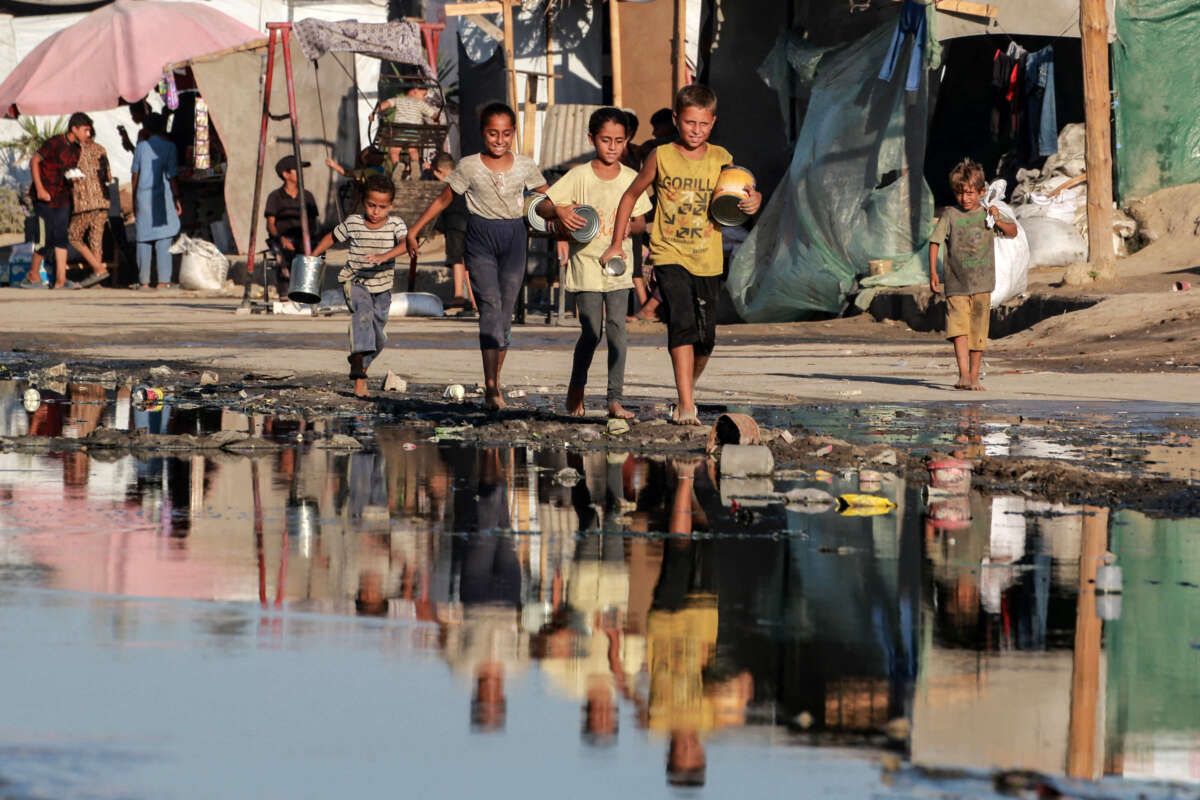Truthout is an indispensable resource for activists, movement leaders and workers everywhere. Please make this work possible with a quick donation.
The Gaza Ministry of Health said on Monday that they now consider Gaza to be a polio epidemic area due to Israel’s relentless assault and deadly humanitarian blockade, portending yet more horrific circumstances being forced on Palestinians in coming months unless Israeli officials agree to a ceasefire soon.
Health officials declared the epidemic in a post on Telegram and warned that it will not only affect Palestinians in Gaza, but also people in neighboring countries. The announcement comes after international health officials announced earlier this month that they had detected the virus that causes polio, specifically polio type 2, in multiple wastewater samples from across Gaza.
The epidemic “poses a health threat to the people of Gaza, to neighboring countries, and a setback to global efforts to end polio,” the ministry said. It called for “immediate intervention” to end Israel’s genocide and address the sanitation catastrophe that has resulted from Israel’s assault on Gaza’s sanitation system.
Health officials have been close to eradicating polio worldwide for years, with type 2 having been declared eradicated in 2015. But with this epidemic, polio may soon spread to nearby areas like Egypt. Children in Gaza and beyond are particularly at risk, as the World Health Organization stopped including immunization from type 2 polio about a decade ago, a decision some have criticized.
Poliovirus is spread through the consumption of fecally-contaminated water or food, and can cause paralysis in affected individuals. The spread of disease in Gaza, including poliovirus, Hepatitis A, and others, has been occurring nearly unmitigated for months, with hundreds of thousands of tons of trash strewn about in large piles, vermin and bugs swarming and sewage filling the streets where children play and people travel.
Conditions are especially bad in al-Mawasi, which encompasses the supposed “humanitarian safe zone” Israel declared amid its invasion of Rafah in May and has since bombed many times. The area is essentially nothing but desert and lacks basic infrastructure; Oxfam said in June that there are only 121 bathrooms for 500,000 people sheltering there, or 4,130 people per toilet. The area has only grown more crowded since June.
Advocates for Palestinian rights have called on the Biden administration to recognize the polio crisis and to act aggressively to pursue a ceasefire and ensure that polio vaccines immediately reach the population of Gaza. The Israeli military has already announced that it will be offering vaccines to its soldiers, but has said nothing about limiting the spread of the virus for Palestinians.
Health officials have said that they have not yet detected any cases of paralysis caused by the poliovirus. But Israel’s assault has rendered disease surveillance virtually impossible.
Last week, U.S. health workers who have volunteered in Gaza amid the genocide said that every single person they encountered in Gaza was sick, injured, or both, with little accounting of disease. It’s possible, then, that there could be many cases of polio infecting people that have gone undetected; the health care workers noted, for instance, that they estimate that tens of thousands of Palestinians have been killed due to Israel’s famine campaign but have not been counted due to Israel’s destruction of the health system and other basic infrastructure.
A terrifying moment. We appeal for your support.
In the last weeks, we have witnessed an authoritarian assault on communities in Minnesota and across the nation.
The need for truthful, grassroots reporting is urgent at this cataclysmic historical moment. Yet, Trump-aligned billionaires and other allies have taken over many legacy media outlets — the culmination of a decades-long campaign to place control of the narrative into the hands of the political right.
We refuse to let Trump’s blatant propaganda machine go unchecked. Untethered to corporate ownership or advertisers, Truthout remains fearless in our reporting and our determination to use journalism as a tool for justice.
But we need your help just to fund our basic expenses. Over 80 percent of Truthout’s funding comes from small individual donations from our community of readers, and over a third of our total budget is supported by recurring monthly donors.
Truthout has launched a fundraiser to add 500 new monthly donors in the next 9 days. Whether you can make a small monthly donation or a larger one-time gift, Truthout only works with your support.
